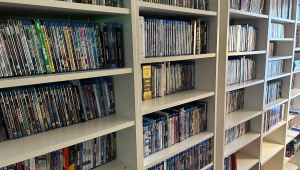All I Want For Christmas

I admit to being prejudiced toward physical, packaged media. I collect things, chief among them music and movies. I want my favorites on the shelf to watch or listen to now, whenever I feel like it. It's good to know they are always available, and no studio whim, de-listing of a given title, or failure of an Internet service can deny them to me once I've bought them.
In our use it and toss it culture, however, not everyone feels that way. Most folks rent their movies, and have little desire to keep then around to watch again. Are HD downloads the wave of the future, and how close are we close to getting them today?
The lesson of music downloads here is telling. Back in the mid 90's I predicted, in a panel session at a Stereophile high end audio show, that the pressure for music downloads would be so strong that we would have downloads long before we could do them well. It didn't take a rocket scientist to make such an obvious forecast, and a decade later we have no more than a handful of struggling high-quality music sites trying to compete with the crappy MP3 downloads pouring into nearly every computer orifice on the planet.
Movies are even tougher. It's one thing to download a song or two in high quality, quite another to download two hours of program material. The technical quality of streaming HD content—which allows you to watch (within limits) while the title is downloading—have received mixed reports from critical viewers, at best, making, it for now at least, the video equivalent of "CD-quality" music downloads.
The only way at present to get the highest quality consumer video over the net is via a slower than real-time download. This takes hours even with the best Internet connection, a process tolerable only to those who won't be satisfied with anything less than true high definition.
Reports on the new Vudu HDX premium HD titles, which offer slow but high quality downloads, have been very positive (I have not yet tried it), though the audio is still lossy Dolby Digital Plus—a format that HD on disc has largely abandoned in favor of lossless Dolby TrueHD and DTS HD Master Audio. (And the Vudu box converts DD+ to Dolby Digital; its HDMI 1.1 interface will not pass the newest audio formats.) Vudu's high def service also remains rental only.
But not every on-line download source offers what we would consider true HD quality, no matter what they call it. Nor do they all offer the same catalog of titles. And most of them require that you use their own proprietary hardware. These limitations are not going to help downloads compete with packaged media.
What we need is a single HD source component. It would be available from every major retailer, on-line and otherwise, sell for as little as $250, and be compatible with every provider's HD Internet service (someone grab a crash cart for Apple's Steve Jobs, STAT). It would require only a wired or wireless connection directly to the Internet (no computer needed—CLEAR!). It would be available in various configurations from any manufacturer who chose to offer it. With up to a terabyte of on-board storage, and a port to link it to one or more standard outboard hard drives, it could store an extensive library of movies and TV shows for instant access, in pristine high definition.
This HD box (and the download services) would not only provide full Blu-ray quality high definition (not so-called HD, compressed to within an inch of its life) but also lossless audio, with full on-board decoding for both Dolby TrueHD and DTS HD Master Audio (or a bitstream output of these formats for customers who want to go that route).
There would be no monthly fee. Rental HD movie downloads would max out at $4. Purchased HD movie downloads would cost no more than $20. TV shows would also be available—but far cheaper per episode than entire films.
Full movie downloads would take less than 30 minutes. Cable and/or satellite services might also have their own versions of such a box. The box would also surf the web.
And no hanky-panky would be possible. Once you've purchased and downloaded a film, no one at the other end could connect to your box and erase any title for any reason. The purchased and stored material would also continue to play even if that particular program provider goes out of business, or if you disconnected from the Internet.
Care to wander a little deeper into dreamland? Such an all-purpose HD source (though probably in a more expensive, high-end version) could also include a Blu-ray player/recorder. It could play back any commercial Blu-ray disc or DVD, and can also rip any of those discs onto the hard drive for easy access at any time in the future—sort of a poor-man's Kaleidescape. Downloaded HD and SD movies that the customer has purchased (not rented) could also be stored on the hard drive and accessed in the same way. Your HD downloads could also be burned (once) onto recordable Blu-ray discs, with full copy protection, and at full quality. These discs would be playable on any Blu-ray machine. Blu-ray blanks would sell for no more than today's recordable DVDs.
You would also be able to record compilations of your favorite HD scenes onto a Blu-ray disc. In fact, even if studios go ballistic about dubbing entire movies (and they would), I could see them allowing movie clips of say, no more than 6-8 minutes in length on the BD equivalent of a mix tape. Passing such as disc around to friends would be free publicity for the film—and likely generate additional film sales. Think of these clips as tailored trailers. You know what turns you and your friends on to a film, something no one-size-fits-all theatrical trailer, no matter how polished, can duplicate.
You won't find this best of both worlds component in stores this coming Black Friday, though Samsung and LG have taken baby-steps toward it with their new, Netflix-enabled Blu-ray players. But I can dream.
- Log in or register to post comments































































